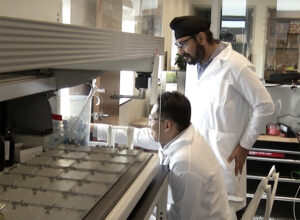
A collaboration between Washington University in St. Louis and Applied Particle Technology (APT), a company founded by university alumni, won the NASA Earth and Space Air Prize competition. The team received $100,000 to develop robust, efficient, durable and lightweight sensors that detect aerosols and monitor air quality in space and on Earth.
Aerosol sensors alert engineers when remedial action is necessary to ensure the health of people on Earth as well as those traveling in spacecraft to the moon or to Mars.
Working together were Jiaxi Fang and Tandeep Chadha of APT, both of whom earned doctoral degrees from the School of Engineering & Applied Science in 2015; Pratim Biswas, the Lucy and Stanley Lopata Professor and chair of energy, environmental and chemical engineering; and Jiayu Li, who is pursuing a PhD in engineering.
After outperforming companies from around the country, the team headed to a NASA facility with two other finalists. They put their technology to the test and were the most accurate in detecting the composition and concentration of aerosols released in a controlled environment to simulate potential exposure to aerosols in outer space, including the space station.
Comments and respectful dialogue are encouraged, but content will be moderated. Please, no personal attacks, obscenity or profanity, selling of commercial products, or endorsements of political candidates or positions. We reserve the right to remove any inappropriate comments. We also cannot address individual medical concerns or provide medical advice in this forum.